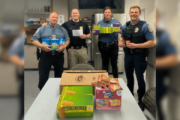SCOTT BAUER
Associated Press
MADISON, Wis. (AP) — The 7th U.S. Circuit Court of Appeals is to hear arguments Tuesday to decide if prosecutors can eventually continue a “John Doe” investigation of Wisconsin Gov. Scott Walker’s dealings with conservative groups during recall elections in 2011 and 2012.
A judge in May halted the investigation, saying prosecutors misinterpreted campaign finance law. Prosecutors are seeking to overturn that ruling, and dismiss the civil rights lawsuit seeking damages that was filed by the Wisconsin Club for Growth.
No charges have been filed against the governor, who is in a tight re-election race and is seen as a potential 2016 presidential candidate.
Some frequently asked questions and answers about the case:
___
WHAT IS A JOHN DOE INVESTIGATION?
It is the name given to investigations allowed under Wisconsin law that are conducted largely in secret and overseen by a judge. Prosecutors can collect evidence and compel people to testify, but the activity is largely shielded from the public. Thousands of pages of documents related to this investigation have become public as a result of this and other lawsuits that have been filed. Eric O’Keefe, the director of the Wisconsin Club for Growth, one of the conservative groups being targeted, also leaked information about the probe. A media coalition wants the entire record to be made public. That will also be argued Tuesday before the appeals court.
___
WHAT IS WALKER ACCUSED OF DOING?
Prosecutors allege the Wisconsin Club for Growth acted as an illegal hub to coordinate fundraising for Walker and other conservative groups, including Citizens for a Strong America and Wisconsin Manufacturers and Commerce. Those efforts came during recall drives against him and Republican state senators in 2011 and 2012. Democrats launched the recall drive in retaliation for Walker’s passage of a law that stripped most public workers of nearly all their union rights.
___
WHAT ARE THE ARGUMENTS?
Prosecutors contend that the conservative groups’ fundraising and spending in the recalls amount to in-kind campaign contributions that should have been reported to the state Government Accountability Board. Under state law, they argue, coordination between independent groups and campaigns results in the groups being considered campaign subcommittees, requiring the candidate to report their spending and contributions. But the Wisconsin Club for Growth argues that coordinating with candidates on issue advocacy — communications that don’t expressly ask a voter to elect or defeat a candidate — is legal and that the investigation is nothing more than a partisan witch hunt by liberal prosecutors determined to tarnish conservatives.
___
WHAT HAVE THE LOWER COURTS SAID?
Reserve state Judge Gregory Peterson, who was overseeing the investigation, rejected the prosecutors’ arguments in January. He wrote that state law prohibits coordination by candidates and independent organizations for political purposes, if those purposes express advocacy — the term in political circles for messages that clearly seek a candidate’s election or defeat. But prosecutors didn’t show any such advocacy in the groups’ activities, Peterson wrote.
That decision has been appealed by prosecutors.
U.S. District Judge Rudolph Randa essentially agreed in May when he put a temporary stop to the investigation. He ruled that prosecutors have incorrectly interpreted state law to require that groups report spending on issue advocacy, which is broader and not directed at a particular candidate. Issue advocacy is protected by the First Amendment’s free speech guarantee and isn’t subject to regulation, Randa said.
It’s the appeal of Randa’s ruling that is being argued Tuesday.
___
WHAT EFFECT HAS ALL THIS HAD ON THE ELECTION?
Walker faces Democrat Mary Burke in the Nov. 4 election and three polls by the Marquette University Law School since May have shown them to be running about even. The July poll asked about the John Doe investigation. Of the 75 percent of registered voters who said they had heard about the probe, 54 percent said it was “just more politics” while 42 percent said it was “really something serious.”
Copyright 2014 The Associated Press. All rights reserved. This material may not be published, broadcast, rewritten or redistributed.







